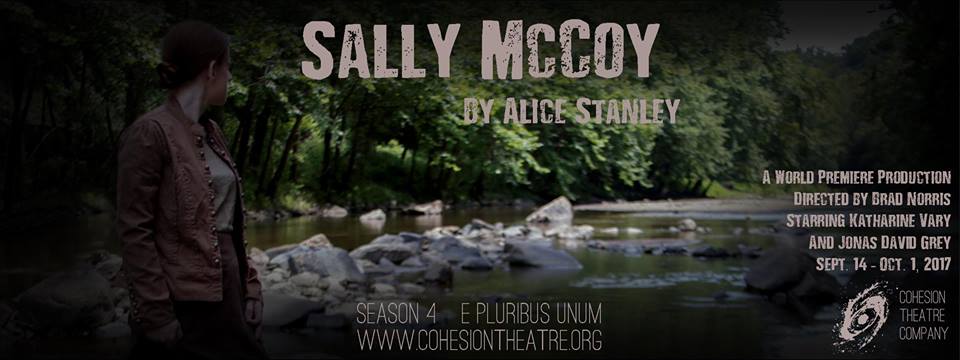Americans always seem ripe for a good feud. Feuds make great headlines and apparently even better entertainment. Ryan Murphy scored television ratings gold this season with his recounting of the on and off screen cat-fighting between iconic movie stars Bette Davis and Joan Crawford. The current Broadway season features War Paint, a musical based on the corporate backstabbing between leading lady cosmetics pioneers Helena Rubinstein and Elizabeth Arden. Nationally, the riffs and hate have become unveiled and brutally wide between Clinton and Trump supporters, exposing the ugliest interior view of America in fifty years. And locally, Cohesion Theatre Company mines their own version of mountain gold out of one of the most colorful chapters in the American folk cannon, the legendary decades long granddaddy of all American feuds between the Hatfields & the McCoys. In their world premiere of Sally McCoy, written by Alice Stanley and Directed by Brad Norris, we are given a glimpse into one critical evening of the saga when one woman’s attempt to heal the families’ deeply self-inflicted wounds could change the course of their history.
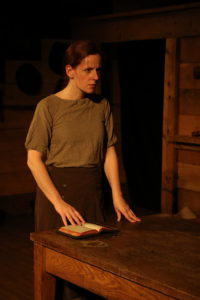
The actual Hatfield/McCoy battle raged across the Kentucky/West Virginia border for the better half of the 19th century (and is thoroughly and engagingly documented along the entrance wall of the performance space in concise timeline fashion by Dramaturg Abigail Cady, with the critical episode involving the story of the evening’s presentation thoughtfully covered for those who desire no spoilers in advance). Originating in 1863 when the lone McCoy fighting for the Union was murdered by a group of Confederate militia believed to be led by a crew of Hatfields, due to the Hatfields being wealthier and better politically connected, charges were never pressed. It further escalated 15 years later with a court battle over the ownership of a prize hog, which Randall McCoy accused Floyd Hatfield of stealing. The judge (a Hatfield, “Preacher Anse”) ruled in favor of the Hatfields, and the key witness was later murdered by two McCoy brothers.
A star-crossed romance or two later, animosity between the families came to full boil over the events of election night 1882, when in a drunken brawl, Randall McCoy’s three eldest sons brutally attacked Ellison Hatfield, leaving him with 26 stab wounds and one gunshot. In retaliation, Ellison’s older brother, the notorious “Devil” Anse Hatfield, organized a posse to kidnap the brothers en route to jail and held them captive awaiting the fate of his brother to personally decide their future. That incident provided the impetus for Stanley’s efforts to recreate the evening when McCoy’s wife, Sally, defied all societal and safety norms to do what her husband refused to— travel to the Hatfield home and plead to “Devil” Anse for her boys’ lives.
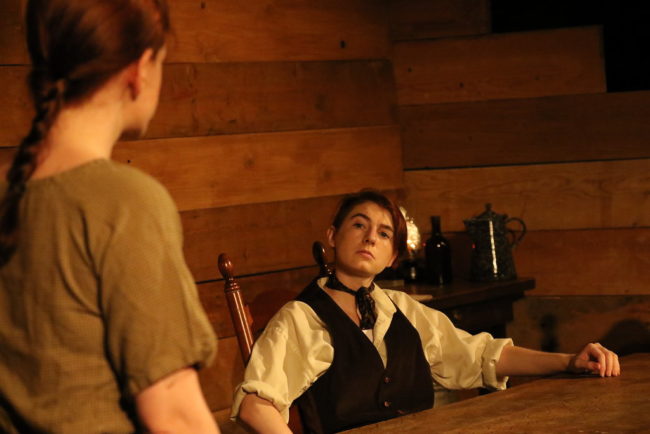
The events are historically documented, but there are no records of what actually happened between Hatfield and Sally McCoy that evening. Yet playwright Alice Stanley envisions a rich conversation between Sally and all the Hatfield men in the household leading up to a showdown with the Devil himself. In the process, Stanley creates an insightful and powerful allegory that touches upon all the social issues that have just as irrationally divided this country in this new, raw age exposed (ironically) 134 years later after election night 2016— misogyny, class war, political corruption, repressed decades of hate, and the intense human desperation of the unheard.
As Sally McCoy, Katharine Vary defines the character for future performers. Her McCoy is the quintessential mountain woman and mother, strong, shrewd, proud, and fiercely protective of her children at the risk of her own life. She defies the boundaries of womanhood in her era, ignores her husband’s orders, travels alone at night, and faces off with better “man talk” than most of the men with whom she deals. Sally McCoy is a woman who insists on being seen and heard decades before it was permissible, and is smarter and more intuitive than most of the men with whom she squares off.
As she interacts one on one with each of the Hatfield men of both generations, what initially appears to be feminine refinement and sensitivity turns out to be an instinctively and very astute reading of each man, progressively manipulating them one by one up the ladder to achieve her goal— access to the evasive Devil Anse and her boys. She plays to the gentler, romantic son Johnse (Jane Jongeward) by feeding his sympathies. She uses the temper of the hothead son Cap (Betse Lyons) to progress one step further in her advance on Devil Anse. She levels with the most reasonable Valentine (Thom Sinn), the boys’ uncle and a local judge, who can most rationally discuss and diffuse sensitive issues with her regarding both his brother and her sons. But the best is reserved for her showdown with Devil Anse (Jonas David Grey) when Vary lays all of Sally McCoy’s cards upon his table, baring her hand and her soul.
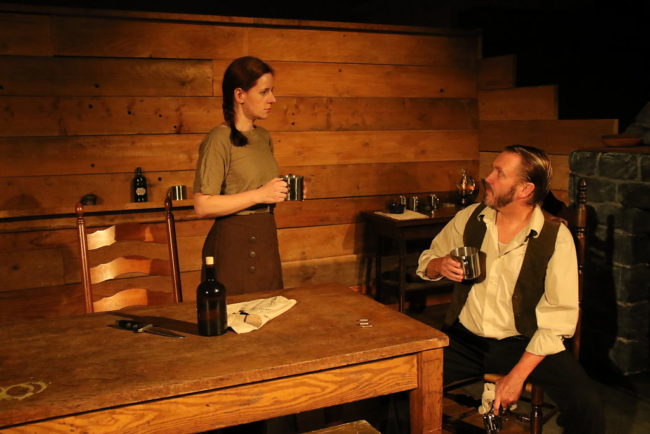
Cohesion sets a standard of unity and inclusiveness in their mission, which also gives additional emphasis to Stanley’s narrative. The initial impressions of their standard, gender-fluid casting may jar some, but the talented actors within minutes not only erase any awareness of gender to any open minded audience member, but add an additional layer of perspective to a story of a woman who will no longer allow men to define her.
Jongeward, as ladies’ man Johnse Hatfield, is the most sympathetic character of the lot. If only allowed, this Hatfield would promote love, not war. Perceived by his own as somewhat of a traitor, he had courted (and in the process) ruined McCoy’s daughter, Roseanna. Yet as Vary plays on him, Jongeward peels away the layers of Johnse as he finds the after effects of his breach that were deliberately kept from him.
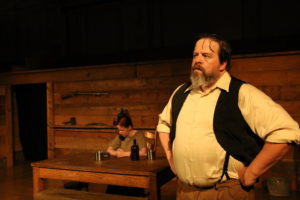
Lyon’s more primitive and explosive Cap Hatfield would end the visit mid act in a flurry of typical brutality if left to his own preferences. Lyon’s performance is an exercise in finely controlled loss of control. The audience is never not aware of the anger, hate, and misguided familial loyalty brewing inside, even without words.
Sinn is a surprise. At the top of the show he exudes a fiercely strong physical presence that rules over the two brothers and the Hatfield homestead. His force is so intense he allows the impression that he is the heavy of the Hatfield clan. But upon Sally McCoy’s entrance, he adeptly shifts gears and reveals the rational, intelligent, and powerful man behind the judge. His scenes with Vary are insightful and give us the requisite back story exposition in an unforced and engaging manner, as if the audience were just overhearing another earful of local gossip.
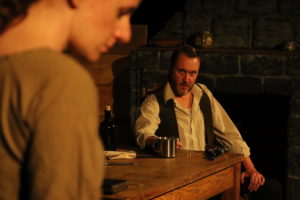
But the best is saved for last. Jonas David Grey has the most inimitable task asked of an actor. The powerful, mysterious, illusive Devil Anse has been talked about by every other character, built up to a mythic proportion in the imagination of the audience for the entire first act. A character seemingly equal parts Atilla the Hun, JR Ewing, and Satan himself, Devil Anse receives his first entrance at the drop of the first act curtain. And let it be stated that embodied in Grey, the anticipation pays off in spades. The first act belongs to Vary as she shifts personas to successfully match wits with the rest of her unsuspecting nemeses. But Grey owns the second act, as his character clears the stage and spends the remainder of the show one on one with Vary in a powerhouse duel. His Hatfield does not underestimate his sparring partner. He is powerful and virile as expected, yet surprisingly eloquent, astute, and wisely approaches Sally McCoy as an equal. His force of nature portrayal of the larger than life Devil Anse Hatfield gives Vary an even broader springboard off which to allow her already impressive performance to bounce. By the end of their life-changing encounter, both characters have utilized every approach, tapped every emotion, and given all they have internally as they literally lay their performances on the floor in an absorbing character study that reaches much deeper than it seemingly intends.
Jess Rassp’s costume designs are appropriately simple but very effective. Every character is clearly delineated in the chosen brown on brown on brown palette. Lana Riggins’ lighting sets the mood through the natural look of washes of evening light available to the era, both interior and exterior. The set designed by Director Brad Norris (who also triple dutied with sound) is one of the most professional looks achieved on a local stage this season. Aged wood in the interior of the Hatfield cabin along with the furnishings and period appropriate props looks like a museum quality display preshow. Added for exceptional effect are the mountains of the Appalachians surrounding the set. Not the least bit necessary, but providing a moving immersive quality to the piece, scenic artists Rassp and Haley Horton add exquisite texture and depth to their combined work.
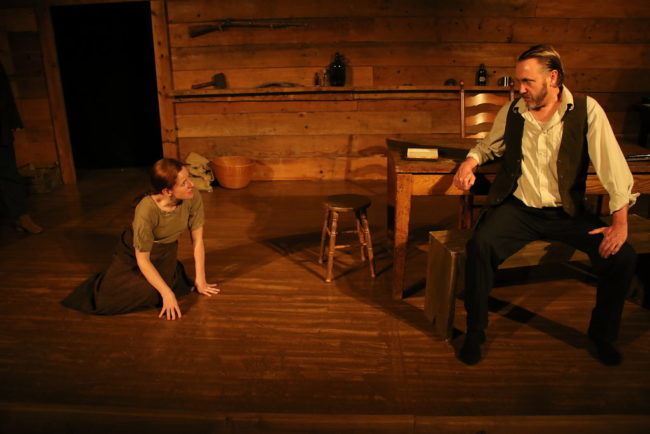
Historically, feuds virtually never end well. Ask the Montagues and the Capulets, the Sharks and the Jets, or even the leading ladies of the aforementioned Davis/Crawford and Rubenstein/Arden pieces. The common lesson the participants all seem to learn too late is not simply that the mutual devastation they encountered was almost universally avoidable, but that the true regrets are the loss of what they all could have accomplished had they only combined their forces instead of working against each other. This theme plays out in Sally McCoy as well as in today’s society, but thankfully for the group at Cohesion, who have accomplished their mission of unity, they have combined their many talents to achieve a greater good larger than the sum of any of its very competent components.
Running Time: Approximately 2 hours and 10 minutes with one intermission
Sally McCoy plays through October 1, 2017 at Cohesion Theatre Company in the Fallout Shelter of the United Evangelical Church— 3200 Dillon Street in the Canton neighborhood of Baltimore, MD. Tickets are available at the door or in advance online.

